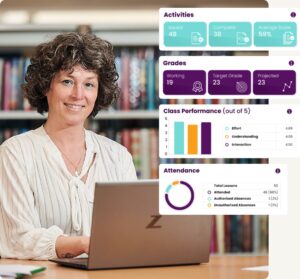Key stage 3 and 4
Academic support courses
Equip your pupils with vital study skills for school, further education, and the world of work with academic support courses at Academy21.

online alternative provision
What we offer
Our academic support courses are specifically designed to support students with additional needs. They are available for Key Stage 3 and Key Stage 4 and teach students crucial skills that they can take back to the mainstream classroom or use to improve their learning elsewhere.
Our teachers and practitioners are fully qualified and experienced in teaching students with additional needs, so they can deliver personalised support to meet students’ unique needs.
These courses are bookable in blocks of 10 academic weeks, with one 40-minute lesson per week, scheduled flexibly within the school day.
Additional learning support
Academic support that gives students the core skills required for progression
Experienced teachers trained in supporting students with SEN
100% live lessons with personalised support
All lesson recording available to students
Accessible online platform with all learning materials
Interactive resources such as quizzes and games
Qualified teachers, practitioners, and counsellors
40-minute lessons, fully flexible schedule
Small class groups of up to 10 students
Flexibility for students to join at any point
Our courses
Available in blocks of 10 weeks

EAL Support
English as an additional language (EAL) Support classes follow the internationally recognised Cambridge English Language Assessment curriculum. Our subject-specialist EAL teachers will teach students the essential elements of grammar, vocabulary and fluency in reading, writing, speaking, and listening. These skills will enable students to improve their learning abilities and to build fluency and confidence.
Courses are available for three levels of English competency: Beginning (Cambridge A1); Developing (Cambridge A2 – B1) and Securing (Cambridge B2).

Literacy Support
Our Literacy Support classes are taught by expert teachers who are trained in dyslexia-friendly teaching approaches and formatting. The classes focus on the following: strategies for spelling and vocabulary building; confidence in using a range of punctuation; practical grammar for school subject contexts and reading comprehension skills for confident skimming, scanning and inference.
This course is ideal for students with dyslexia-related needs, knowledge gaps in English due to missed learning, or those who require additional support to be able to thrive in their learning in this area.

Numeracy Support
Our Numeracy Support course can build up students’ confidence in maths, thus tackling the potential for ‘maths-based anxiety’. All classes are taught by experienced subject specialists with full QTS who are trained in inclusion-based teaching approaches and formatting.
The Numeracy Support course covers skills such as times tables and managing operations; knowledge of measurement, fractions, decimals, and percentages; and strategies for working with worded problems. The KS4 classes are suitable for KS4 learners seeking to be ready for a more exam-focused curriculum.

Maths Support
Our Maths Support course is available for Key Stage 4 only and it is more challenging than our Numeracy Support course. It focuses on topics fundamental to success at GCSE such as calculation problems, simplifying algebra, probability, and data representation.
The activities in lessons include interactive resources and quizzes with a focus on academic content which is tailored to the needs of the students.
This course is ideal for students with significant dyscalculia, knowledge gaps in maths due to missed learning, or those who require additional support to be able to thrive in their learning.

reporting and monitoring
Keeping track of students’ progress
There are regular formative tasks to help students consolidate their learning and two graded assessments to understand student performance. These take place in week 3 and week 7 of the course and are published in week 5 and week 9 respectively.
The student’s school or LA receives a personalised report at the end of each course cycle (Week 10), so they can understand how the student has progressed.
The report includes further details of course content, an outline of the content that will be covered in the following term, and details of students’ strengths and areas for improvement.
